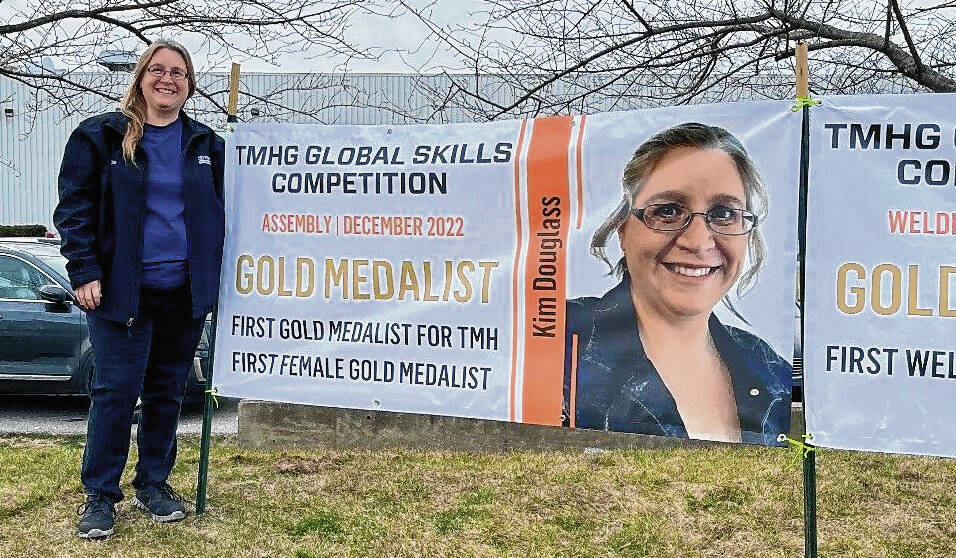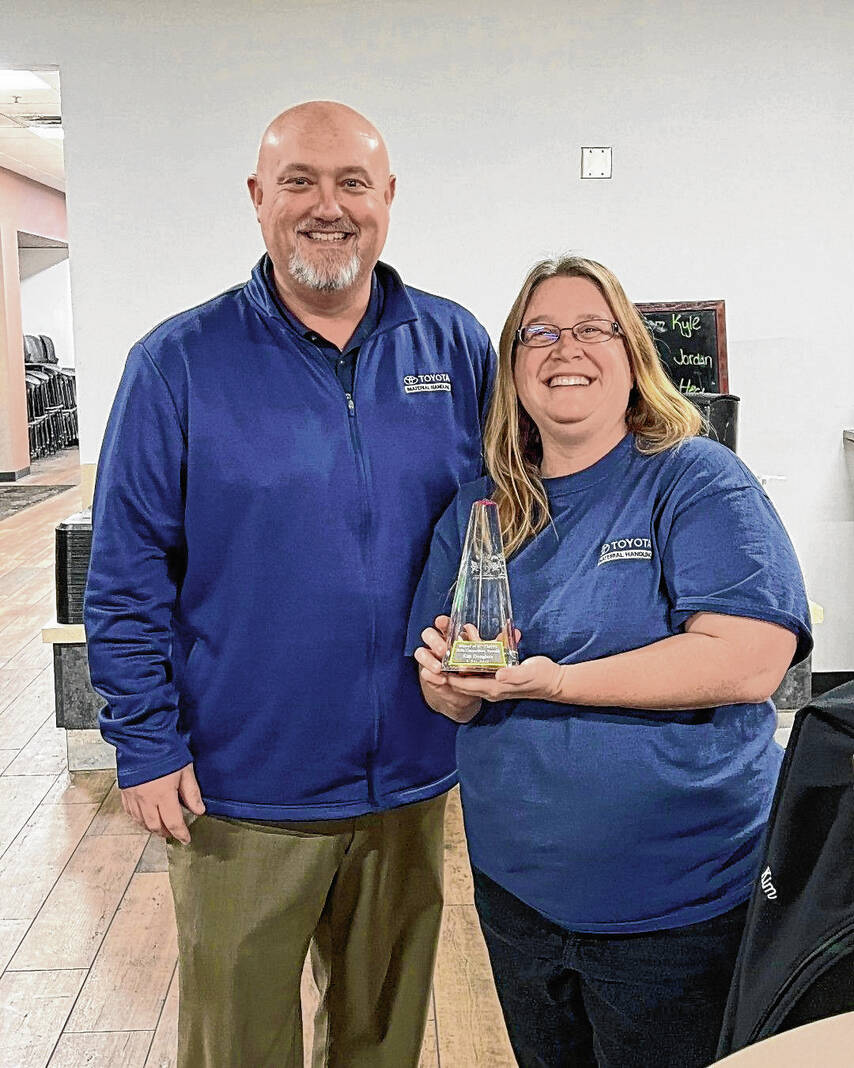Seymour native Kim Douglass has worked in many areas of the assembly line at Toyota Material Handling in Columbus.
She had been with the company for 13 years when she found out it was starting an internal competition for the chance to be selected to compete in the Toyota Material Handling Group Global Skills Competition in Takahama, Japan.
Two years went by since the program started, and she thought about trying out, but due to nervousness and uncertainty that she would be selected, she went about her day.
It wasn’t until this past year, TMH’s third year into holding the internal competition, that she mustered the courage to try out. It was only then she saw all of the opportunities for
In that same year, she earned the gold medal in the assembly category of the international competition and made history by becoming the first woman to place.
To her surprise, she was selected as the company’s representative for the assembly category when she first tried out for the internal competition. From there, she challenged competitors in a regional competition from The Raymond Corp.’s Greene, New York, and Muscatine, Iowa, factories prior to the international competition in Japan.
Gearing up for the international competition, Douglass spent a full year in the TMH training department preparing for what was to come. Some of her training days would only be a few hours, and other days when she wasn’t busy, she would train all day up to eight hours or more.
The training dojo was made up of two practice stations in which Douglass would spend her time. One station that would make up for half of the competition was torquing, applying an amount of pressure to a bolt. Douglass would practice that by hand with a bolt and measuring it by feel. The other station, which Douglass said was the most difficult part, was assembling plates, much like a puzzle piece, making sure to not leave gaps, overlaps and complete as fast as she could.
“It took me about a month to remember, so I would lay them on the table over and over again and try to memorize them. It took me awhile, but I finally got it,” Douglass said.
In December, Douglass flew to Japan for a nine-day trip to compete in the global competition.
She ended up trying different Japanese foods during her trip but described herself as a picky eater and found that McDonald’s was a good option for dinner most nights.
“The McDonald’s in Japan was actually quite similar to the ones in America with some different options. They had a macaroni and cheese burger, which was interesting,” Douglass said.
This was her first trip outside of the United States, and it became a whole new experience for her.
“It was awesome. It’s a whole different culture over there, but then I also got to see where Toyota Material Handling gets their culture, too,” she said.
Toyota Industries Corp. started out in 1926 as Toyoda Automatic Loom Works Ltd. manufacturing the automatic loom in Japan. After branching out from looms to automobiles and forklifts, the first production site outside of Japan was established in Columbus as Toyota Industrial Equipment Manufacturing Inc. in 1988. The first forklift rolled off of the line at the Columbus factory in 1990.
Even though she was across the world, Douglass was still able to see the same practices she sees at work back home.
She landed in Japan on a Monday night. Tuesday and Wednesday were scheduled training days, where she and other competitors went to the factory and trained at assigned training tables. The tight schedule consisted of 45 minutes to an hour training session, and then the participant would step out and let the next person train. Thursday was the big day, where they used the same training area and tables the whole time she was there.
On competition day, the participants were put into two groups and competed in a square area with four competition tables set up in the middle of the plant. Four participants from group one competed in the torquing portion. Then group two competed in its torque portion. Then the groups took a small break before they moved on to the plates portion of the competition.
Douglass said there were about 20 to 30 people watching the competition, and when she first entered the training area, reality started to set in.
“This is real. This is it. I really wanted to win and bring home the gold for Toyota,” Douglass said.
As the competition edged closer, she thought of all of the people back home, both from work and her family, encouraging her to do her best and bring home the gold.
Douglass also developed bonds with other competitors as they encouraged and pushed each other in the competition. She still keeps in touch with fellow competitor Paige Franze, a female representative from Raymond Muscatine, who finished third in the competition.
Douglass finished assembling the plates in 3 minutes, 16 seconds and completed the torquing portion of the competition in 8 minutes, earning herself the gold.
When the time came in the competition to see the results of who won, Douglass stared at the screen waiting for a name to pop up.
“I started thinking like, ‘Oh, I just don’t know if I got this or not.’ But when my name came up, I looked at my coach and said, ‘Really?’ I hugged my coach and ran up front and hugged my other competitor, who place third (Franze). It was just the best feeling ever,” she said.
Douglass placed first in the assembly category, beating competitors from other Toyota-based companies in China, France, Italy, Sweden and other U.S. competitors.
Douglass felt an abundance of motivation and inspiration from her colleagues at work, her family, her competitors and her coach, Matt Heuer, throughout the training and competition. Right before she left for the competition, Toyota Material Handling showcased a banner with signatures from everyone in the plant to wish her good luck in Japan.
“When I turned around and saw that banner, I knew I had to do it for them,” Douglass said.
Once she returned with the gold medal, TMH celebrated her win with a special campuswide day in her honor, coined Kim Douglass Day. Her day was completed with many signs and banners, the cafeteria serving her favorite meal and gold cookies decorated with red, white and blue ribbons attached to them.
Now that Douglass has brought home the gold, she will not be able to participate in the competition again; however, TMH already is in the process of looking for the next competitor.
Tryouts for the next competition are currently underway, and the next competitor will likely be announced in March. That person will train from April to December.
With gold medal in hand, Douglass learned a big lesson about courage throughout this experience.
“For me, I learned to not be afraid,” she said. “If there is something that you want to do, just do it. You never know what is going to come out of it. I had no clue that I would win or be the first woman to win this competition.”
A lot of the women were proud of Douglass for this accomplishment, showing the importance of girl power.
“The fact that we are showing everyone that women can do it, it’s awesome,” Douglass said.
TMH has an internal program called Toyota Women’s Impact Network, or T-WIN, that focuses on empowering and encouraging women to pursue a career in material handling.
With Douglass’ success, the organization plans to use her as an example for what they hope to see in the future, showing women that the sky is the limit. They hold community and internal events educating women on the different opportunities within the material handling industry. With support from both male and female allies, this organization has been able to offer leadership opportunities and events to encourage women within the industry.
Douglass’ success has inspired the organization in its efforts to empower women and lead them to growing opportunities. Since winning the gold medal, Douglass now has the opportunity to grow within the company to different areas, such as administration.
She is excited for new opportunities coming her way while working at Toyota and finishing her degree in business administration.


